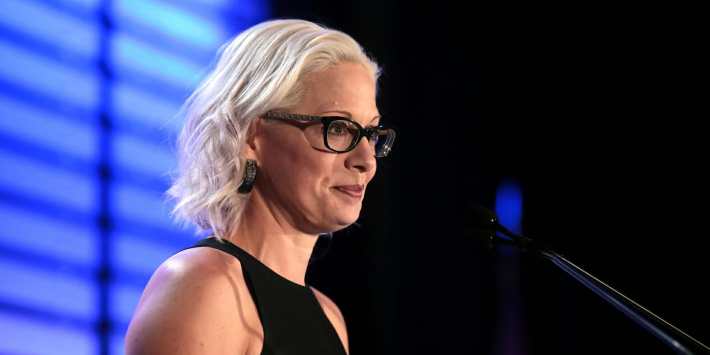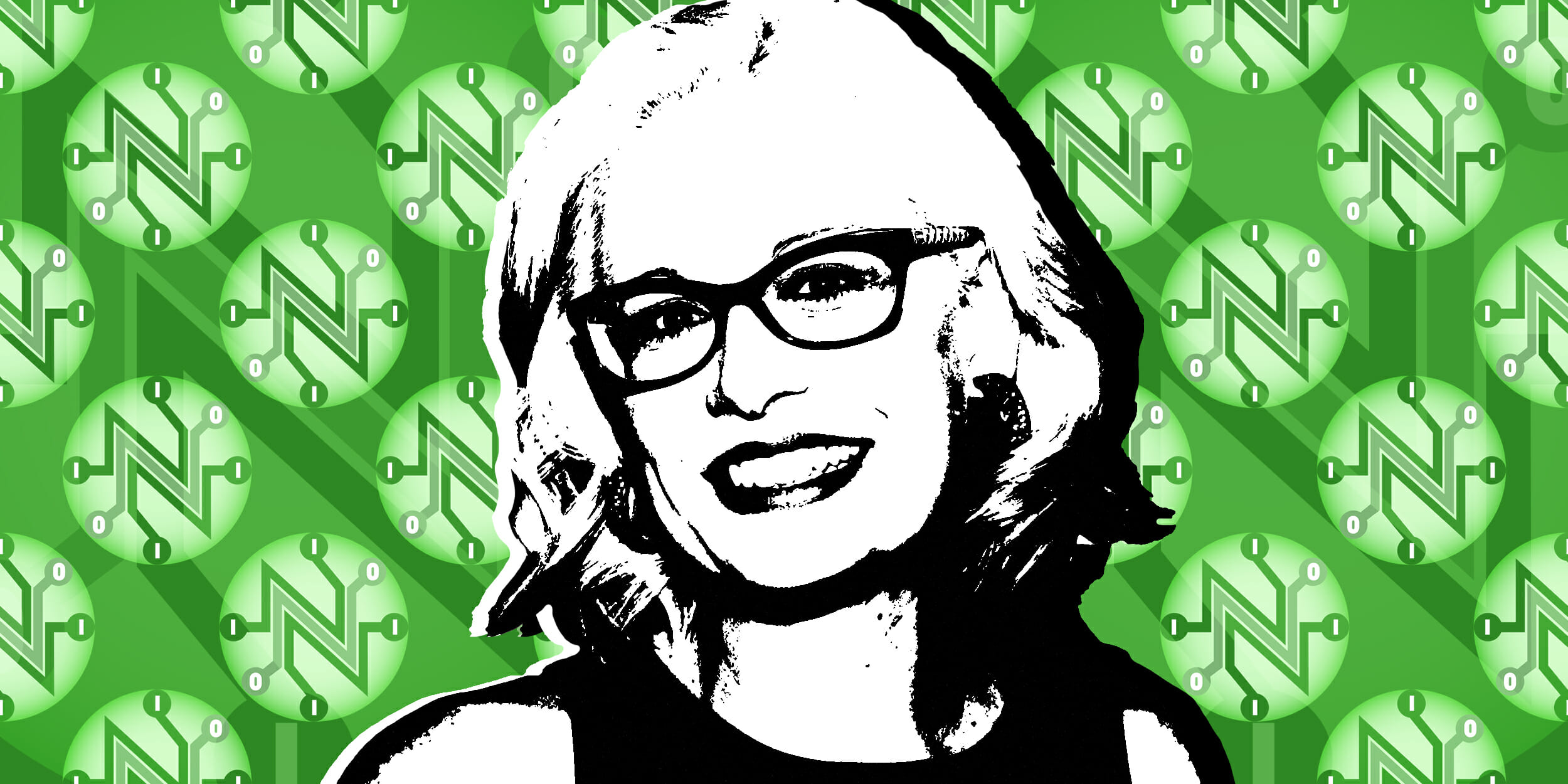When the Save the Internet Act, a bill that would restore net neutrality rules, was introduced in Congress in March, nearly every single Democratic senator jumped on board to co-sponsor the bill. And given the enthusiastic and unanimous support a similar measure received from the party last year in the chamber, it wasn’t a surprise.
But one name was missing from the lengthy list of co-sponsors: Sen. Kyrsten Sinema (D-Ariz.).
Her absence from the list—where every Democrat and independent who caucuses with the group signed on—quickly prompted questions from pro-net neutrality groups. That pressure reached a breaking point this month when digital rights group Fight for the Future put up a crowdfunded billboard highlighting the Arizona senator's stance on the issue along a major highway in Phoenix.
It reads: "Sinema is Corrupt! She’s siding with corporate donors to kill net neutrality so you pay more for worse internet."
Advocates have begun to question why Sinema is breaking with the rest of her party—and constituents are making their displeasure known.
...
While other Democrats in the Senate co-sponsored the Save the Internet Act, Sinema announced that she formed a working group with Sen. Roger Wicker (R-Miss.) to try and work "across party lines to find a bipartisan solution." The Save the Internet Act passed in the House last month, leaving it with an uncertain fate in the Senate and a looming veto threat from the White House.
However, that alignment with Wicker—the chair of the Senate Commerce, Science, and Transpiration Committee, which controls the Save the Internet Act's path in the Senate—left some net neutrality advocates puzzled. Because it appears the Mississippi senator wants nothing to do with a bill like the Save the Internet Act.
In February, speaking at the INCOMPAS Policy Summit, Wicker made it clear that he was against any kind of net neutrality legislation that included Title II of the Communications Act as its foundation—like the Save the Internet Act does—and that he didn't view net neutrality legislation as "something we absolutely have to do."
"I think there was a whole lot of hyperbole a year or so ago on that issue," Wicker said. "Can we agree that we're all for an open internet? I hope we can agree that we don't need rate control by the federal government, and that's what bothers a lot of us on the Title II thing. I like enforcement by the FTC, some people like enforcement by the FCC. I don't know if we'll get there this year."
Wicker continued, expressing why Title II was a non-starter for him:
"But to the extent that we could pass something that didn't have rate regulation, that didn't have Title II regulation, and gives the light-touch approach that balances proper regulatory oversight with broadband internet, and doesn't allow the blocking and throttling, but keeps a climate where the technological innovation that has really transformed a generation can continue… I hope we can do that."
The debate over Title II has lawmakers on both sides digging in deep, and like most net neutrality arguments in Congress, it appears to be what will be at the center of Sinema and Wicker’s working group.
"In my book, she’s no different than having a Republican. Either she decides to be on the right side of history on this or I think she should be primaried out."
Title II concerns “common carriers,” like a utility. Many Democrats and advocates have argued that it serves as the only legal foundation for net neutrality rules, while Republicans have said it is an overly burdensome regulation for the internet. Amid the hearings on the net neutrality vote in the House last month, Republicans also expressed concern with Title II's use in the Save the Internet Act.
Rep. Bob Latta (R-Ohio) listed off a number of hypothetical scenarios that could happen if the full weight of Title II were enforced, including rate controlling, like Wicker mentioned in February. Democrats argued that the law makes it difficult for such scenarios to occur because they require an act of Congress.
Republicans offered their own net neutrality bills ahead of the House vote for the Save the Internet Act, which addressed common fears of repeal like throttling, blocking, and paid prioritization, but stopped short of using Title II as a foundation.
Sinema's office told the Daily Dot she felt similarly to Wicker: She does not believe regulation under something like Title II of the Communications Act is the right way to regulate the internet.
Wicker and Sinema have met, the senator’s office said, and ultimately they hope to introduce "bipartisan" legislation.
While the working group is bipartisan in the sense that a Republican and Democrat are heading it, it is unclear whether any pro-Title II Democrats have been approached to work with the group.
Sinema's office said the group has met with "a diverse group of experts with a wide range of opinions on how to codify net neutrality, protect internet freedom, and ensure robust investment," but did not respond to a request for clarification about specifics on who the experts were.
"The senator believes that the internet requires a modern regulatory framework which only Congress—in a bipartisan fashion—can accomplish," a spokesperson for the senator told the Daily Dot. "She doesn’t think that this one piece of legislation would accomplish that."
Representatives for Wicker did not respond to a request for comment by the Daily Dot.
Mark Stanley, the communications director at Demand Progress, called the working group a "charade," considering Wicker's past statements on net neutrality.
"This so-called working group has no intention of considering [the Save the Internet Act], which really provides the bare minimum protections," Stanley said. "Given Wicker’s position on this issue, not much of anything productive can come out of it. So it’s disappointing that this is where Sinema is expending her time and energy on this issue when there is common sense legislation that has had bipartisan support, that has basically passed both chambers—passed the House this year and passed the Senate via the CRA last year with bipartisan support."
READ MORE:
Fight for the Future published a letter the senator's office sent to a constituent in which she says she fears "laws designed in the 1930s for utilities may have serious unintended consequences."
It continues: "Broadband providers require a modern regulatory framework that ensures net neutrality and encourages the freedom, innovation, and investment that make the internet the vital tool it is today."
The advocacy group pointed out Sinema's response was similar to those used by Senate Republicans ahead of the Congressional Review Act (CRA) effort last year, as well as groups representing internet service providers.
Last year, when Democrats tried, unsuccessfully, to use the CRA to try an overturn the FCC's repeal—essentially what the Save the Internet Act does—three Republicans broke ranks with their party and voted for it: Sen. Lisa Murkowski (R-Alaska), Sen. Susan Collins (R-Maine), and Sen. John Kennedy (R-La.). The CRA passed the Senate but died in the then-Republican-controlled House.
Sinema’s stance could have ramifications this time around, should the bill come to the floor for a vote despite Senate Majority Leader Mitch McConnell (R-Ky.) insisting it won’t.
"Sinema has put herself way out there as the only Democrat who is refusing to help restore net neutrality, and I would say the important thing to note here is not just that she’s ignoring this bill, she’s actively undermining efforts to get it passed by partnering with Roger Wicker on this disingenuous working group," Josh Tabish, a technology exchange fellow at Fight for the Future, told the Daily Dot. "The idea that this working group is going to produce meaningful alternative net neutrality legislation is a total farce. I think that what she’s doing is actually much worse than Republicans across the aisle who oppose it, because she’s not just ignoring it, she’s actively undermining it, and that’s a real problem."
Tabish added:
"There is no reason she couldn't co-sponsor the bill and participate in a working group. It is possible to walk and chew gum at the same time."

Every net neutrality vote could be critical
While McConnell has said the bill is "dead on arrival" in the Senate—making any chances the bill has a steep uphill climb—net neutrality advocates say they hope enough pressure could lead it to eventually making its way to the floor.
After the 2018 midterms, Republicans gained seats in the Senate. Given the current makeup of the chamber, if Murkowski, Collins, and Kennedy hypothetically all voted for the net neutrality bill—Kennedy has indicated his stance on his CRA hasn’t changed—and Sinema held out, the final tally would be 50 to 49, killing the bill.
Even if Sinema did vote with the rest of her party, and the same Republicans voted in favor of it, the vote would be split, meaning Vice President Mike Pence could cast a tie-breaking vote against it.
Ultimately, President Donald Trump would also need to sign the bill into law; the White House has signaled it would veto it. With such long odds, it’s also possible that the bill could also serve as a litmus test for some voters heading into the 2020 elections, like the CRA votes were for many voters in last year’s midterms.
Sinema was one of a handful of Democrats last year who did not sign onto the House version of the CRA, despite saying in 2014 that she believed "we must protect net neutrality" in a tweet and following the FCC's repeal in 2017 said Congress should "take action to correct this bad decision."
The act needed 218 votes to force a vote, but ultimately wrangled together just 182 votes. Sinema was one of 13 Democrats who held out.
If the Senate hopes to pull off another surprise net neutrality victory, Sinema’s support is critical.
Sinema's campaign contributions
Besides allying herself with Wicker, who just months ago signaled that a net neutrality bill like the Save the Internet Act was not a priority, advocates have begun to point to donations from telecommunications industries in the wake of her decision to steer clear of the bill.
This isn’t the first time campaign contributions have been brought up in the net neutrality fight. Ahead of the FCC’s repeal vote, the Verge reported that Sinema received $134,046 in campaign contributions from the telecom industry and connected entities while a member of the House, according to data from the Center for Responsive Politics. Meanwhile, Wicker received $724,850. Before the CRA vote deadline, Motherboard also noted that Sinema received contributions from Comcast.
Data from the Center for Responsive Politics also shows that Comcast, which does not support Title II regulations, was Sinema's 16th largest contributor, giving $35,725 in donations through individuals and PACs from 2017 to 2018.
It also shows the now-senator received $63,543 from "telecom services" from 2017 to 2018, with more than half of that coming from PACs rather than individuals.
The Center for Responsive Politics data shows lawmakers on both sides of the aisle received contributions from “telecom services” last election cycle.
Sinema’s telecom contributions are lower than a number of other Democrats like Sen. Jon Tester (D-Mont.), Rep. Frank Pallone Jr. (D-N.J.), and Rep. Mike Doyle (D-Penn.). However all three of those lawmakers—and other Democratic senators on the list—have supported the current net neutrality bill.
Tester co-sponsored the Save the Internet Act when it was announced and Pallone and Doyle were two of the main House members who pushed the bill through the House earlier this year.
"Really, if you look at it, the only place we really see any opposition to net neutrality is D.C., where the telecom industry has used campaign contributions and lobbying to persuade mostly Republicans to oppose net neutrality. So with her current approach, Sinema is really is just simply aligning herself with the telecom industry and lobbyists and against the public. It’s just a really bad look," Demand Progress’ Stanley said, later adding: "Any time you see a member of Congress who’s taken a lot of campaign contributions from ISPs, and who opposes net neutrality, I think it’s absolutely right and fair to raise that connection, and it's extremely concerning."
Besides the CRA, there was another potential marker for Sinema's Save the Internet Act decision. In 2016, the Arizona lawmaker—then in the House—was one of a handful of Democrats who broke with the party and voted for a Republican-backed bill that would have prohibited the FCC from regulating broadband rates, according to Morning Consult. Former President Barack Obama threatened to veto the bill if it reached his desk.
Constituents push back
Some of Sinema's constituents told the Daily Dot they were disappointed in the senator's decision not to co-sponsor the bill and hope she ultimately decides to back it.
Jennifer Tanner, a real estate developer in Arizona who said she canvassed for Sinema ahead of her Senate election last year, said the senator's decision not to co-sponsor the bill has given her second thoughts about spending the time to push for her during the midterm elections.
"The feeling now is, since it's obvious she’s the only Democrat to stand with Republicans against restoring the net neutrality rules that Obama put in that Trump with Ajit Pai took out, I’m sorry that I did that," she told the Daily Dot. "In my book, she’s no different than having a Republican. Either she decides to be on the right side of history on this or I think she should be primaried out."
Tanner, who said net neutrality was a "make or break" issue for her as a voter, added:
"I hope she wakes up. There are representatives before that have woken up and changed their mind and been on the right side of history. She can still do that. She can be forgiven and do the right thing; she absolutely can. The question is will she? Does she value her voter? Two hundred houses, I spent weeks, I spent a month doing that, a month of my life. It's not a good feeling."
Other Arizona residents had similar sentiments.
"She says she's for net neutrality, but here she is giving the reason 'this bill can’t pass in the Senate'... I just don't accept that. This is too important of an issue," Joseph Dungee, a computer technician from Arizona, said. "I did support her, but I did not know she had this stance on net neutrality. If I had known that beforehand... I would have had a problem with that."
Chris Sessa, an Arizona resident who works in information technology, said he hoped Sinema would ultimately support the bill, adding that she was his representative before running for Senate.
"I was completely shocked that she's kind of taken this position, and even some of the posturing and the language that I hear from her. She's lining up as if she's crossing the aisle, and to me she's crossing a line," Sessa said. "This is not a singular issue with a singular problem. To me net neutrality is much bigger than that."
Kimberly Glynn, a minister and grief recovery specialist in Arizona, said on the surface she appreciated the idea of bipartisanship when tackling a net neutrality bill because it's a "complex issue," but also felt campaign contributions gave her pause.
"When you look at the Save the Internet Act, again it's a complex issue, but if we look at everything that's been proposed it seems like this is probably the best of what's out there," Glynn said. "If she's truly authentically trying to reach across the aisle then I appreciate it, however, I certainly have concerns about anybody who is getting money from whatever you want to call it: big telecom, broadband, big cable, whatever it is currently being called–which she is. So that's a concern to me, and that automatically causes me to call into question if she truly is authentically trying to reach across the aisle. I would hope that would be the case, and if so credit to her."
Meanwhile, some local outlets like the Phoenix Business Journal have published blogs praising Sinema for “reaching across the aisle” to work on net neutrality legislation.
Steven G. Zylstra, the president of the Arizona Technology Council, said in the post the Save the Internet Act was a missed opportunity for Congress and he didn’t blame Sinema for not liking “the choice she was given.”
While there may be mixed feelings among some Arizona residents, net neutrality advocacy groups say Sinema’s billboard is a sign of things to come.
Tabish said he hopes the billboard Fight for the Future put up last week will not only cause the Arizona senator to reconsider co-sponsoring the bill, but also will "send a message" to other senators that "if you mess with the internet, you're going to get burned."
"This is something that deeply motivates constituents, including folks in Arizona, so Sinema would ultimately be wise to side with her constituents on this over telecom giants and lobbyists," Stanley, of Demand Progress, said. "Our hope is she comes around quickly and gets behind the Save the Internet Act and stands with her constituents and supports strong net neutrality protections that are vital for free expression."
READ MORE:






